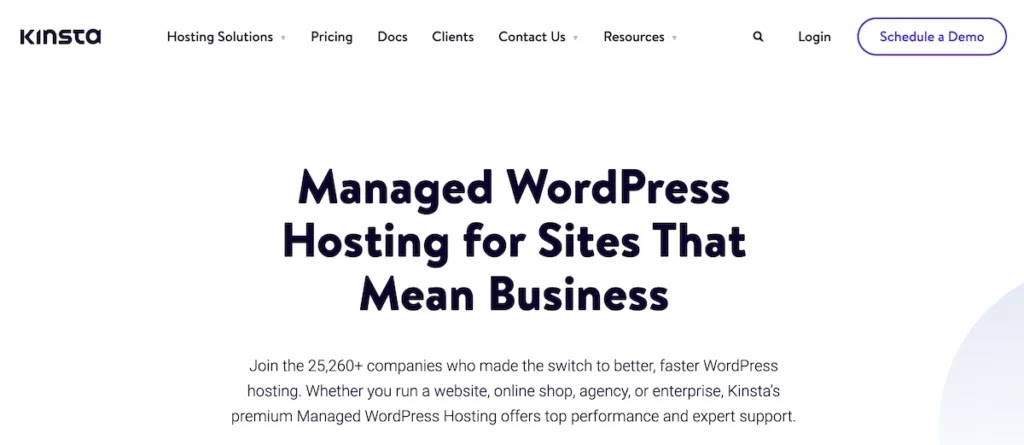Confused by the many WordPress hosting options you may find online?

Be at ease. We are available to you.
WordPress is so widely used that a whole industry of hosting has sprung up to provide all different kinds of plans, from inexpensive $3 per month shared plans to business-focused $700+ per month dedicated plans.
While having a lot of options is typically a positive thing, it might be perplexing for newbies who are just starting started with WordPress hosting.
I'm going to spend this piece discussing five different kinds of WordPress hosting that you can use for your WordPress website to assist you choose the one that's best for you.
5 Several WordPress Hosting Types Are Compared
When selecting a certain kind of WordPress hosting, you're often striking a balance between three key ideas:
• Price
• Usability, both in terms of technical know-how and useful WordPress features
• Performance, both in terms of website load speeds and capacity to manage heavy traffic
Of course, different hosting companies will also provide different smaller, more particular functions.
You should see how these three ideas relate when I go through the next five WordPress hosting possibilities.
Shared Hosting – The Cheapest Type Of WordPress Hosting
Beginner bloggers or those with low-traffic blogs who don't want to spend a lot on hosting should choose this form of hosting.

First, let's talk about shared hosting. This is the least expensive kind of WordPress hosting, and it's what I often suggest to newbie bloggers building their first WordPress website.
The term "shared" hosting refers to the fact that when you use it, you effectively share a web server with a number of the host's other clients.
What would motivate you to share a room? However, the only justification is that it ends up being affordable. By combining resources, you may pay as little as a few dollars each month.
For instance, Bluehost, which I often suggest for newcomers, has a monthly starting price of only $2.95.
Also, shared WordPress hosting is quite simple to use since it is often marketed to newbies. That is, even though they often don't provide many complex features, the majority of shared hosting make it quite simple for you to install WordPress and do other basic tasks.
What is the drawback if shared WordPress hosting is affordable and user-friendly?
performance in the main.
Your host places restrictions on the resources you may use since different sites and users use the same server, ensuring that everyone is treated fairly.
Hence, although shared hosting is perfectly suitable for low-traffic websites, you will inevitably start to exceed the capabilities of your shared environment once your website begins to see an increase in traffic.
You may wish to upgrade to one of the other choices on this list when that occurs.
Several helpful WordPress features are available with managed WordPress hosting.
The ideal WordPress customers for this form of hosting are those who don't mind spending a little more for services like automatic updates, backups, security, and knowledgeable WordPress support.

A general term used to describe hosting based on a range of underlying technologies is managed WordPress hosting.
In other words, managed WordPress hosts may be found utilising:
- Dedicated servers.
- Cloud hosting.
- VPS hosting.
But, I believed that managed WordPress hosting still merited its own category on our list due to how well-liked it is among WordPress users.
The primary benefit of managed WordPress hosting is that it is fully optimised for WordPress, allowing you to concentrate only on developing content and promoting your website. This is true even if the majority of managed WordPress servers offer decent performance.
The following tasks are often handled by managed WordPress hosts:
• Updating your WordPress installation
• Daily site backups
• Setting up performance-enhancing tools like server-side caching and CDNs.
• Protecting your website using tools like firewalls designed specifically for WordPress and other security measures
Also, they often provide you additional beneficial services like staging sites along with knowledgeable WordPress support.
An Improvement Over Shared WordPress Hosting: Virtual Private Servers
The greatest candidates for this form of hosting are those who require more power than shared hosting can provide while yet trying to keep costs down.

A virtual private server, usually referred to as a VPS, is a kind of hosting service that falls in between shared hosting and a dedicated server.
Even when you utilise a virtual private server, other users still share server space with you. Nevertheless, here is how it differs from shared hosting:
You have a certain amount of room to yourself. The term "virtual private" refers to this.
Your plan is hence totally isolated from other websites on the same server, which provides the following advantages:
• There's no need to pool resources. Regardless of what other sites are doing on your server, your site receives its own allocation of resources.
• Greater management of your server. You have greater control over elements like settings and software as your "virtual" area is private rather than shared.
Many hosting companies provide two kinds of virtual private servers:
• Unmanaged - since you're in charge of setting up and operating your server, this option calls for some networking expertise.
• Managed - Your host "manages" the server on your behalf, so you don't need to have any technical expertise.
Here are some recommended hosts to get you started if VPS WordPress hosting is something you're interested in:
• Bluehost
• SiteGround Cloud Hosting - Options For Any Budget
All users benefit from this form of hosting since it makes it simple to grow the resources (and prices).
Yet, some cloud hosting companies need technical expertise.
A new kind of hosting called cloud hosting uses a cloud architecture to host your website rather than a single physical server.

Scalability is one of the major advantages. The underlying technology allows for fast addition and removal of resources. For instance, if your site suddenly experiences a surge in traffic, you might swiftly scale your resources at that time and return to normal once the spike has passed.
You may discover unmanaged cloud hosting providers even though some of the previously listed hosts, like Kinsta, were created using cloud hosting technologies.
These are the things you'll be in charge of with these providers:
• Improving efficiency and resource use
The advantage, though, is that if you're technically savvy, you can find a low-cost, scalable, and high-performing WordPress hosting.
Here are some recommended providers to get you started if cloud WordPress hosting is something you're interested in:
• DigitalOcean: While it is inexpensive, using it takes technological expertise.
• Cloudways - allows you to choose from a variety of cloud hosting providers and makes cloud WordPress hosting considerably more user-friendly for beginners.
Dedicated Server: Expensive Yet Performance-Supportive
The ideal customers for this sort of hosting are those that have high traffic websites and require excellent performance on a large scale.

With dedicated WordPress hosting, you get exclusive use of the whole server. You are not need to confine yourself to a virtual partition or share resources (as with shared hosting) (like a VPS). The server is all yours.
Benefits of doing so include:
• Performance - Even with heavy traffic, a strong dedicated server will be able to give quick page loads.
• Control - Because you own the whole server, you may modify it anyway you see fit.
You may find dedicated servers that are both, like a VPS:
• Managed \s• Unmanaged
The primary disadvantage of a dedicated server is undoubtedly its price. Even inexpensive dedicated servers run you around $100 per month, while a more capable dedicated server will likely cost you $300 or more (or more).
The most well-known WordPress servers have dedicated solutions if you're interested in dedicated hosting.
Conclusions About WordPress Hosting
I hope you now have a solid knowledge of the many WordPress hosting options that are out there.
I advise going with inexpensive shared hosting if you're just starting started with WordPress until your site begins to get a lot of traffic.
After then, you can think about switching to one of the more costly solutions.
Also, opting for managed WordPress hosting is a wonderful choice if you want the easiest, most hands-off method of hosting your WordPress website since your host will take care of a lot of the technical aspects for you.
What kind of hosting do you use for WordPress? Comment below and let us know!
